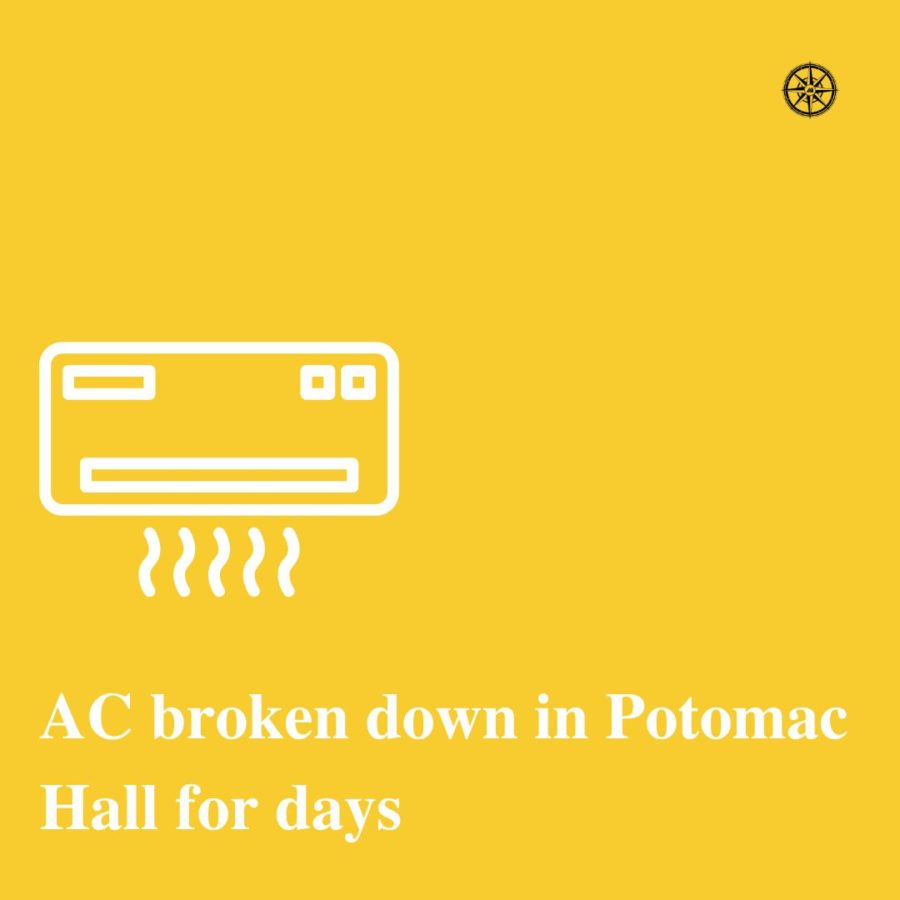AC Broken Down in Potomac for Days
The Potomac North AC going out is not news anybody wanted to receive. Going inside your dorm to beat the 90 degree heat is something everyone looks forward to after walking back and forth from classes. Laying on your bed after an exhausting day or sitting at your desk to do work in amazing AC is what everyone expects to be able to do . That is, unless you lived in Potomac River Hall from Sept. 4 to Sept. 8. During those long 5 and a half days, all residents in Pono (Potomac North) and Poso (Potomac South) suffered immense heat and humidity in weather that reached the high 90s inside of their spaces.
When asked what critical moment made him and his suitemates sleep in the library, Robbie Pritchett, a freshman finance major from Pono, said, “I woke up, and I was just covered in sweat. I was dressed in just shorts and was still sweating….It’s just not worth it. And considering I had no air for two years at one point, and nothing had ever felt as hot.”
Pritchett also expressed concerns for his security regarding his nights spent in the library, “I felt like I was being watched all night.”
Pritchett said he felt self conscious that others would come into the room where he was sleeping and take pictures. He had also struggled with sickness due to the abrupt pressure and temperature changes pertaining to the AC in his dorm.
“I would never sleep in the library again,” Pritchett said.
He continued, “ I went to the academic buildings just to use the bathroom because it wasn’t worth being in there and getting so hot and having to cool down for 30 minutes after that.”
Pritchett’s roommate, Ben Porter, a freshman finance major, also experienced inconveniences due to the broken AC.
Porter said,“ You would walk outside and it was cooler than it was in here.” Both roommates said that they tried to spend as little time as possible in their room because of the intense heat.
“I tried to be in here as little as possible. I would study in the library, make sure I didn’t have to go by the dorm by any means. Staying away from the dorm was necessary,” Porter went on to say.
When asked what made Porter decide to sleep in the library, he responded with, “We were in here [the dorm] trying to fall asleep and it just got to a point where it was unbearable.”
Their suitemate who slept with them in the library, Wyatt Miles, a freshmen and marketing major explained how sleeping in the library was a “ last resort option” as he said that simply sleeping in his car, which was parked in the parking lot behind Pono, was way too dangerous.
Miles also expressed that he was, “begging to crash on someone’s floor or in someone’s common room, trying to figure out a situation.”
All three suitemates expressed the lack of “ real” sleep due to the fire alarm going off and continuing to blink lights at around midnight the night of the 5th, only two days after the AC went out.
After a long night spent in the library, a new email from the University Housing Operations was sent out on Sept. 6th, 2022.
“We are pleased to share that parts to repair the air conditioning in Potomac have been secured and the repairs are in progress. Currently, we anticipate the repairs will be completed tomorrow evening, Sept. 7, 2022.”
Following this email came another email attached to it that said,”“Thank you for your patience during the emergency repairs of the Potomac air conditioning system. As repairs on the system progress, we have unfortunately found additional damage. We have a staff member driving to the factory in Maryland to pick up the additional repair parts and now expect repairs to be completed Thursday afternoon.”
As different individuals shared their experiences, The Captain’s Log reached out to the University for comment. When asked why there were such delays in fully repairing the AC, a University Housing spokesperson said, “ When equipment needs repair, timelines vary depending on the problem and availability of parts once the repair needs are determined. In this case, as the repairs were in progress, additional repairs were identified creating additional work and additional parts needed to get the equipment back in service. To help expedite the work and minimize the equipment downtime, a University staff member from the Facilities Management team drove to Maryland late into the night in order to get parts back onsite for the crew to continue working instead of waiting for parts to be packed and shipped.”
When asked if he felt that maintenance did all they can do, Miles said, “ I know they are super understaffed so it wasn’t their fault. I would put it more on administration to recognize the problem sooner.”
Your donation will support the student journalists of Christopher Newport University. Your contribution will allow us to purchase equipment and cover our annual website hosting costs.


